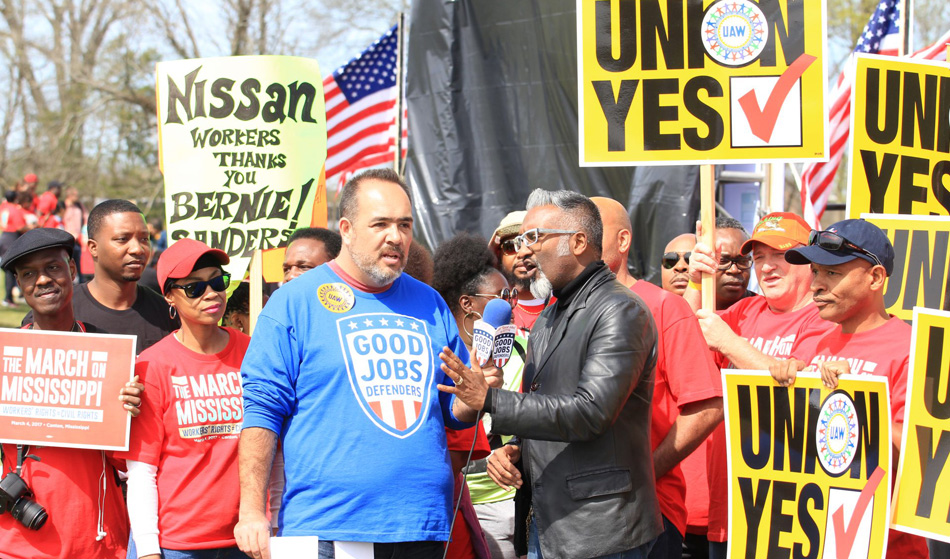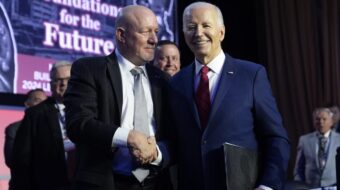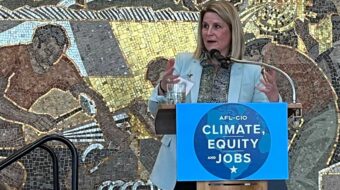
ST. LOUIS — Jim Gibbs, the vice president and organizing director for the Mine Workers, said he walked into a meeting of international union organizing directors recently and he didn’t like what he saw: 37 older white guys and him, the lone African-American. On October 23, Gibbs gave the AFL-CIO convention a piece of his mind on that.
The delegates were discussing and unanimously passed, a resolution to plan the AFL-CIO’s commemoration next year, in Memphis, Tenn., of the 50th anniversary of the murder of Dr. Martin Luther King Jr. King was in the Memphis to campaign for sanitation workers’ right to organize with AFSCME, to get respect on the job, to get decent wages and safer working conditions.
Passing the resolution was one thing, and so was the composition of the convention. It’s almost precisely half women and minorities. But putting women and especially minorities in positions of power is quite another. Like the organizing directors, few national union leaders are women, minorities or both.
“There comes a time when you gotta say what’s on your mind,” Gibbs said in an exclusive interview afterward. “You can’t organize the South without people of color on the organizing teams or in leadership,” the Roanoke, Va., resident added. “I’d be less of a man if I didn’t go and say something about this.”
Gibbs’ comments from the convention stage – “I get wound up sometimes,” he admits – touched on a long-time sensitive subject within the labor movement. Old CIO unions, led by the Mine Workers, were integrated. But as late as 1961, some craft unions barred African-Americans.
Just two years before that, A. Philip Randolph, president of the Brotherhood of Sleeping Car Porters, had to threaten to yank his union, the nation’s pioneering majority-black union, out of the AFL-CIO unless the federation started requiring integration by all its unions.
About a decade ago, the convention adopted the diversity goals to try to ensure the movement’s delegations are as diverse as its members. And the federation’s Executive Council added seats several years ago specifically earmarked for women and minorities.
Even with that mandate, AFL-CIO Secretary-Treasurer Liz Shuler had to give her colleagues a scathing tongue-lashing, behind closed doors, about the lack of women in leadership positions, during an Executive Council meeting in Atlanta.
And lack of diversity harms organizing, Gibbs declared, especially in the South. There, organized labor confronts outright political hostility, companies that always pit black against white, the history of the racism-inspired so-called right to work laws, and corporate plantation mentality and domination.
As a result, the South, despite past struggles going back to the textile strikes of the 1930s, is the least unionized section of the U.S., and its politicians are exporting their “values” to the rest of the nation.
In the South, unions make a big mistake of not organizing with people who look like the people they’re trying to organize, Gibbs said.
“You cannot organize these folks and expect them to succeed when they see 12 white guys in a black neighborhood,” he explained.
And support from prominent outsiders and groups is fine, but they shouldn’t be the face of the organizing drive. The face must be people within a plant who can credibly talk with their fellow workers.
Gibbs reported a generational split within organized labor in confronting that diversity-in-leadership challenge. After his speech, and during the interview, younger and female delegates were coming up to him and thanking him for speaking out.
And at least two notable leaders – RoseAnn DeMoro of National Nurses United and retired AFL-CIO Executive Vice President Linda Chavez-Thompson – also agreed. But nobody else brought the leadership diversity issue up from the convention podium. Gibbs is not surprised, given the scripting of the convention.
“But if you believe in something strongly enough, speak up,” he declared.












Comments